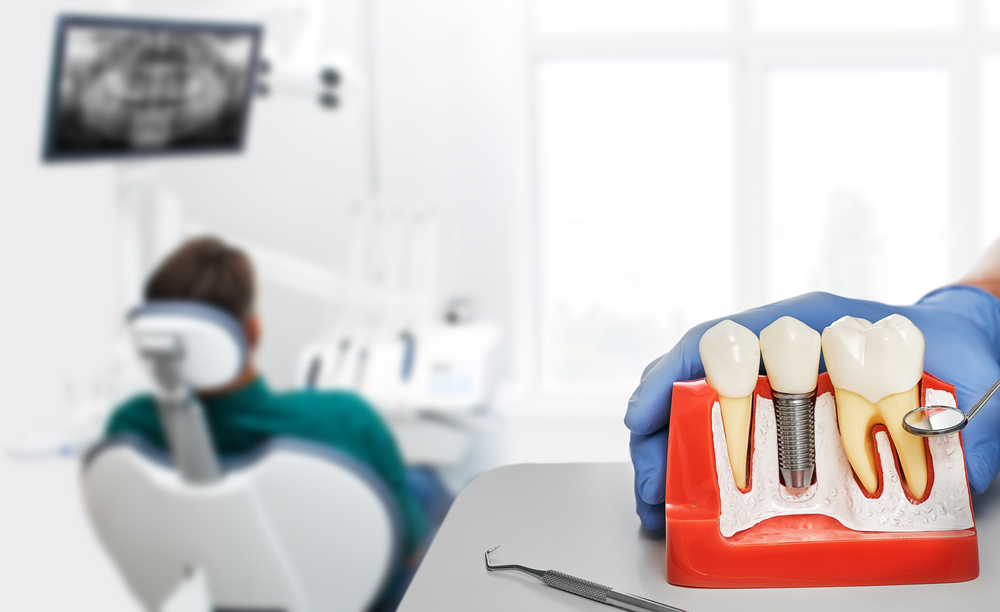
by elision | Jan 30, 2023 | Dentist
Are you interested in getting dental implants in Illinois? If so, you may have plenty of questions about the process for getting them. What is involved? How long does it take? What can you expect? Let’s go over the process of getting dental implants, from start to finish.
The initial evaluation
Before you can begin the process of receiving dental implants, your dentist will have to determine whether or not you are in fact a good candidate for getting them. What makes a person a good candidate for dental implants? Your dental practitioner will make sure that you meet the following criteria:
- Your jawbone has enough strength and density to support implants.
- You have good oral health and your gums are disease-free.
- You are able to commit a timespan of months to the full implant procedure.
Your dentist will check for other factors too, such as whether or not you are pregnant, and if you smoke cigarettes, as these could impact your candidacy.
Determining the type of implant you should receive
During your evaluation, your dentist can help you decide what kind of implant would be best for you. There are several different kinds of dental implants:
- A single-tooth implant works for people who are missing one tooth.
- An implant-supported bridge is a row of crowns that are supported by implants at each end of the row. This option can be ideal for patients who are missing multiple teeth that are next to each other.
- Full-mouth dental implants can be a great option if all or most of your teeth need replacing.
Your dentist will also help you decide how deeply your implants should be placed.
Implant placement
Before the implant is placed, any teeth that need to be taken out will be removed. Then, a titanium post will be inserted into your jaw. The surgery can take around 1 to 2 hours, depending on how many implants you are getting.
Healing
Your jaw and gums will need plenty of time to heal. Your jawbone will integrate itself into the titanium post, making the post sturdy and ready to receive a crown. This healing process can take months. Once you are healed, a small connecting piece called an abutment is placed onto the titanium post.
Making new crowns
Your dentist will make crowns to replace your missing teeth. These will then be attached to the abutments to complete your shiny, new dental implants.
Enjoy your new teeth!
You can now enjoy a bright and healthy smile! Healed dental implants function much the same as natural teeth. Speak with your dentist to find out if there are any foods or habits that you should avoid to make the most of your dental implants.
Caring for your dental implants
Just like natural teeth, dental implants require upkeep. You will need to continue brushing with a soft toothbrush and flossing daily. You should also schedule regular dentist visits to make sure your implants are doing well.
Would you like to schedule an evaluation to discuss dental implants in Joliet? Call Smile League Dental in Joliet today! Our friendly and knowledgeable team would be happy to answer any questions you might have. You can reach us at 815-782-6243.

by elision | Jan 2, 2023 | Dentist
You have probably seen tubes of charcoal-infused toothpaste, charcoal floss, and black-bristled charcoal toothbrushes on store shelves while shopping for your oral care items. Using activated charcoal has become a popular way to whiten teeth.
Oral health isn’t the only benefit that people are trying to glean from charcoal. The mineral is used in skin treatments, as food supplements, and even as a natural deodorant. The effectiveness of these myriad usages of activated charcoal is up for debate, but here we will focus on one of its most exciting applications: whitening teeth!
What is activated charcoal?
Activated charcoal is a heat-treated form of charcoal, a carbon residue. Charcoal forms when wood is burned in a low-oxygen environment. Treating charcoal with extremely high temperatures results in charcoal that is extremely porous–a substance that we call activated charcoal.
Traditionally, activated charcoal has many common uses. Its high porosity makes it an excellent tool for absorption. Many emergency room doctors use it to absorb toxins from the bodies of patients who are experiencing poisoning or overdose. Activated charcoal is also used in many water filters, as a natural way to help remove unhealthy compounds from drinking water.
Does activated charcoal really whiten teeth?
If your teeth are yellowed from drinking coffee or tea; from eating foods and spices that contain staining pigments; or from tobacco use, then we have good news for you: activated charcoal can indeed help whiten your teeth. Studies show that the porous substance is effective in reducing surface stains. When you brush with activated charcoal, the fine grains are able to bind to particles staining the surface of your teeth, which helps to remove them.
Is it safe to brush with activated charcoal?
Activated charcoal may be helpful as a teeth whitener, but we recommend that you use it with great care. Despite its current popularity, charcoal may actually be harmful to your teeth. Abrasive grains of charcoal can eat away at the enamel of your teeth, weakening them and leaving them vulnerable to developing cavities. Such wear and tear on tooth enamel could even cause your teeth to become more yellow over time! Many dentists agree that more scientific research is needed to determine the true safety of activated charcoal when it comes to dental health.
How else can I whiten my teeth?
Hydrogen peroxide and baking soda are two substances that are commonly used to whiten teeth. These can be found in many whitening toothpaste. The best effective way to whiten your teeth is to visit your dentist. Dentists can provide safe and effective teeth whitening through bleaching and other treatments that can address both surface stains and discoloration that can appear beneath the enamel of the teeth.
Call Smile League Dental today!
Are you curious about activated charcoal and other teeth-whitening options? Would you like to schedule a consultation to determine if a teeth-whitening treatment is right for you? Please feel free to contact Smile League Dental in Joliet. Our friendly team is happy to share its expertise with you to help you make the best decisions for your oral health.

by elision | Dec 5, 2022 | Dentist
When you brush your teeth and floss each day, you know that you are completing an important daily routine that keeps your mouth clean and healthy. But did you know that scrubbing your pearly whites also helps to keep your entire body in optimal health? Having an unhealthy mouth does not just result in discomfort, pain, and costly dental procedures. Poor dental health can actually affect your digestive, respiratory, and circulatory systems. It can even affect your brain.
Oral bacteria
How can poor dental health have such an impact on an individual’s overall health? One of the primary ways is through oral bacteria. A healthy mouth naturally contains a certain amount of bacteria. However, gum disease and oral infections can cause an overabundance of the wrong kind of bacteria to thrive in the mouth. There are various ways that oral bacteria can spread to the rest of the body:
- Bacteria is swallowed into the digestive system.
- It spreads into the lungs when we breathe in.
- It can be absorbed through blood vessels and into the bloodstream.
Again, consuming a certain amount of bacteria is perfectly normal and healthy. However, if a person has too much bad bacteria in their mouth–perhaps from tooth decay, gum disease, or an infection–they could run the risk of spreading too much harmful bacteria to the rest of their body.
Dental health and diseases
Studies have shown that poor dental health can be associated with a variety of ailments in other areas of the body. What does science know about the link between oral health and certain diseases?
Cardiovascular Disease
Research has shown that poor oral health can lead to blood vessel inflammation and sometimes infection of the inner lining of the heart, both of which can contribute to heart disease.
Alzheimer’s Disease
Scientists are studying how oral health may be linked to dementia and Alzheimer’s Disease. Older people who have gum disease or oral infections may be more likely to develop Alzheimer’s.
Pneumonia
Pneumonia is a dangerous infection of the lungs. Harmful bacteria can travel from the mouth to the lungs when an individual breathes in. When such bacteria reach the lungs, there could be a risk of developing pneumonia.
Inflammatory Bowel Disease
Inflammatory Bowel Disease, or IBD, is a term for digestive diseases that involve inflammation of the digestive tract. Studies have shown that those who suffer from IBD can benefit greatly from maintaining good oral health. Having a healthy mouth can mean fewer IBD symptoms and flare-ups.
Other Diseases and Disorders
Poor dental health may also contribute to the development of pregnancy complications; an increased risk of stroke; skin infections; diabetes; and many other ailments.
Smile League Dental
If you are concerned about maintaining your overall health and well-being through your dental health, or if you simply wish to get the best quality dental care available in the Joliet area, please feel free to get in touch with us. At Smile League Dental, we are passionate about providing our patients with excellent care in a comfortable and family-friendly clinic. You can reach us at 815-782-6243.
by elision | Oct 10, 2022 | Dentist
As one of the better states for dental in the country, Illinois Medicaid covers a range of dental procedures for kids and adults. However, the best way to know for sure is simply to ask your dentist (or your plan provider) about coverage.
Smile League is here for you — we’ll do everything we can to help you get access to the dental care that you and yours need. Our Joliet family dental practice has plenty of experience with a wide range of insurance, Medicaid plan managers, and standard Illinois Medicaid. We even have some interest-free financing options for things that aren’t covered.
General Rules for What Procedures Are Covered
Medicaid in Illinois generally covers the majority of medically necessary dental procedures you would encounter. For example, if a child has dangerously crooked or twisted teeth, Medicaid might cover some orthodontic costs to correct that condition with braces.
On the other hand, you probably would not see Medicaid covering most procedures that are considered cosmetic. Another child with only slightly crooked teeth probably would not have coverage for braces, for example. Tooth whitening would probably not be covered, nor would cosmetic prosthetics.
Another thing to consider is the need for approval. Sometimes, your dentist might need to confirm approval of the procedure before doing it. There are some big exceptions — for example, don’t worry about pre-approval if you have a dental emergency.
Understanding Illinois Medicaid
Illinois Medicaid can be confusing, even if you have had it for a while. Some people avoid going to the dentist just because they’re not sure if they have coverage.
Especially for kids, most of the things you need are covered. Others have different ways to pay that you can probably afford. Our team is here to help you — our Joliet neighbors — figure out how to get the care you need for you and your family.
You’ll find a long list on our website of all the Medicaid versions our office handles. If you don’t want to read through it, that’s fine too. All we will need is your credentials, and we can confirm everything before we get started. You can even contact us to confirm coverage beforehand if you’re somewhere else in Chicagoland — or if you just don’t have time to stop by. The whole process should only take a few minutes, and then you’ll know.
Get Some Personal Advice
When it comes to dental procedures, we are talking about a very personal thing. This is your set of teeth, and any work you do should fit your personal needs. An appropriate procedure for someone else might not be the right one for you.
If you’re ready to get started, please come by for a consultation. We’ll help you understand your options — both in terms of treatment and in terms of getting the most out of your Illinois Medicaid coverage.

by elision | Sep 19, 2022 | Dental Implants
[vc_row][vc_column][vc_column_text]
Are you looking for dental implants in Joliet? If you are anywhere in the area here in southwestern Chicagoland, stop by Smile League Dental. The best, quickest, and most reliable way to know that you’re a good candidate for implants is to get a professional recommendation.
We’re going to give you some more information than that, but, please, consider booking an appointment. We are one of Joliet’s best-rated dentists and we’re accepting new patients — why guess about implants when you could know for sure?
With that out of the way, let’s look at who can get implants. We’re also going to talk about why people get implants during the course of this article.
Are You a Candidate For Implants?
If your jawbone is done growing, and if you do not have serious bone loss, you are probably a good candidate for dental implants. Let’s look at each of those points.
Dental implants are really only for adults. In theory, 18 years old is the earliest that anyone would want to get implants. In practice, it might be safer to wait a few years more to make sure that your jaw is fully matured. In the meantime, there could still be other options for you if you have missing teeth. Don’t hesitate to get a professional opinion just because you’re too young.
The next qualification is that you have to have adequate bone left in your jaw to support the implant. If you have some bone loss, you also might be able to get a bone graft to provide stability for the implant. Implant technology has come quite a long way, even in the past decade or so. Check in with us at our Joliet office to see if your level of bone loss still keeps you from getting implants.
Should You Get Implants?
Just because you could get implants doesn’t mean you necessarily should. While dental prosthetics are the gold standard for replacing teeth, they aren’t the best choice for everybody. Here are some indicators that you should consider getting dental implants:
- You can accept undergoing simple surgery in our Joliet dental office to install the implant
- You want the most permanent tooth replacement option available
- You want to match the look and feel of natural teeth
- If you have significant bone loss, you feel healthy enough to undergo a grafting procedure, recovery period, and implant
- You’re willing to invest a significant amount more than dentures require, potentially financing your procedure or using insurance
- You have teeth to replace!
Implants aren’t scary or abnormal. Ask around — you’ll probably find that quite a few of your neighbors, friends, and coworkers have dental implants. If you’re asking around the Joliet area, some of those acquaintances might have even had their implants installed right here at Smile League Dental. Contact us at 815-782-6243 to get started with a professional consultation.
[/vc_column_text][/vc_column][/vc_row]





Recent Comments